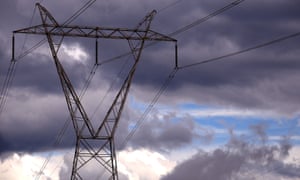
Westpac has promised to stop supporting thermal coalmining, joining other major financial institutions in promising it will not back the fossil fuel industry through investments or loans beyond 2030.
It leaves ANZ as the only big Australian bank not to have pledged to get out of thermal coal, the dirtiest fuel used in mass electricity generation.
Environmental activists said Westpac’s commitment, which over the next decade includes not taking on new thermal coal customers and limiting support for mines or projects in existing coal basins, was “another nail in the coffin” of the thermal coal industry.
It came as Westpac decided to not pay an interim dividend to shareholders after it posted a first-half profit slide because of hefty impairment charges related mainly to the Covid-19 pandemic.
Australia’s second-largest lender reported a 70% slump in cash earnings to $993m for the six months ended 31 March, from $3.30bn a year earlier. Net profit was down 62% to $1.19bn.
A bank statement released on Monday said Westpac recognised climate change was one of the most significant issues that would affect long-term prosperity of the global economy “and our way of life”. It committed the bank to managing its business in alignment with the goals of the Paris climate agreement, including a transition to an economy that has “net zero” greenhouse gas emissions by 2050.In a list of principles, the bank said climate change was a financial risk, that addressing it would create opportunities and called for the re-introduction of a carbon price.
It promised to lend another $3.5bn to climate solutions over the next three years and ensure its financing of electricity plants supported a path to zero emissions.
“Westpac’s preferred policy position is that a broad, market-based price on carbon is the most effective, affordable, flexible and equitable means of achieving emissions reductions at the least cost across the economy,” it said.
On thermal coal, it said it would support existing customers as it reduces its exposure to the fossil fuel to zero over the next decade. It would continue to offer finance for metallurgical coal, used in steel production, while supporting technology developments to reduce the steel industry’s dependence on it.
On oil and gas, it said it would assess their role in the transition to a low carbon economy while providing finance in line with its commitment to the Paris deal.
The group’s executive director, Julien Vincent, said the bank’s stance was a nail in the coffin of thermal coal and a warning to the federal government if it planned to boost fossil fuels on the way out of the Covid-19 pandemic.
“This plan shows it won’t be happening with Westpac’s cooperation,” Vincent said. “Last year, the Commonwealth Bank was the first to commit to be out of thermal coal by 2030 along with all three of our general insurers. Now, anyone trying to operate a coalmine or power station in Australia by the end of this decade will need to do it without Westpac as well.”
Market Forces said it hoped the new policy meant Westpac would reverse its recent lending trends, including $5.4bn in loans to coal, oil and gas projects since 2016, far more than the bank made available to renewable energy projects.The activist group found Westpac increased its new investments in fossil fuel projects by 8% in 2018-19 compared with the previous year. The bank said its overall exposure to climate polluting industries, including longstanding investments, fell by 16%.
The group’s chief executive, Emma Herd, said in the past few months some of the world’s biggest funders of coal projects, including Japanese banks Sumitomo Mitsui and Mizuho, had ruled out directly funding new coal plants. Others, such as HSBC, had tightened existing policies.
May House, an economic analysts with the Australian Conservation Foundation, welcomed the announcement and called on financial institutions to ensure their financing and investment portfolios were focused on both rebuilding the economy and addressing climate change and biodiversity loss.
“For Australia’s big four banks, this does not end at setting an exit date for financing thermal coal, but should extend to ruling out funding any new or expanded oil and gas projects,” she said.


